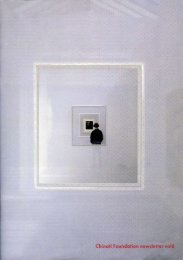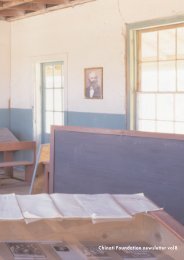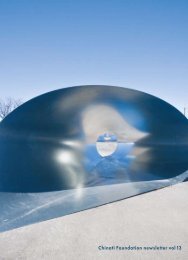Untitled - The Chinati Foundation
Untitled - The Chinati Foundation
Untitled - The Chinati Foundation
You also want an ePaper? Increase the reach of your titles
YUMPU automatically turns print PDFs into web optimized ePapers that Google loves.
We have the desire to work, and opportunities,<br />
and a wonderfully human<br />
atmosphere. 33 “Art,” she maintained,<br />
had “always been considered esoteric…and…outside<br />
of general life.<br />
[At Black Mountain College, Josef<br />
showed] that you can build a general<br />
character through art, that you can<br />
incite interest…in knowledge of any<br />
kind through art. That any exploring…and<br />
[any] discipline…can be<br />
developed within art.” 34<br />
Josef worked unstintingly and conscientiously<br />
to promote the college<br />
and its educational aims. He had<br />
not been long in the United States<br />
before he began receiving invitations<br />
to teach, and to talk about his<br />
teaching, throughout the country. He<br />
developed and articulated his convictions<br />
of how creative education<br />
(in music, drama, and literary arts<br />
as well as the visual arts) contributed<br />
to the growth of creative individuals,<br />
and folded that thesis into an explication<br />
of practice as it developed<br />
at Black Mountain College. Albers’s<br />
ideas were aired not only in Black<br />
Mountain College publications but in<br />
books, magazines, and journals as<br />
varied as Progressive Education (October<br />
1935), <strong>The</strong> American Magazine<br />
of Art (April 1936), Architectural<br />
Record (1936), New Architecture<br />
and City Planning (1944), Design<br />
(1946), and Junior Bazaar (1946).<br />
Though he was a bit skeptical, the<br />
writer Alfred Kazin marveled at the<br />
“utopian impulse” of the people he<br />
encountered at Black Mountain College.<br />
“[<strong>The</strong>y] stood out…they were<br />
like nobody else…they were terribly<br />
exceptional. <strong>The</strong>y were idiosyncratic,<br />
crazy, wonderful…there wasn’t<br />
a dull…banal, person there.” 35 <strong>The</strong><br />
faculty generated an infectious intellectual<br />
and creative capital that was<br />
inversely proportional to the college’s<br />
financial wealth. Without trustees or<br />
an endowment in a time of general<br />
penury, Black Mountain was perennially<br />
dependent on soliciting funds<br />
from a small group of foundations<br />
and individual donors. <strong>The</strong>re was<br />
never enough money. It may be that<br />
constant living on the edge—while it<br />
eventually strained the fabric of the<br />
community to its breaking point—intensified<br />
the focus on the creative, inventive,<br />
and productive life.<br />
<strong>The</strong> energy and commitment that Albers<br />
devoted to the college was repaid<br />
by the freedoms it allowed him<br />
and Anni: “Absolute freedom…of<br />
doing and existing and saying what<br />
I want to say.” Freedom to not teach,<br />
if need be: “[When I was teaching at<br />
Harvard] I couldn’t say ‘I’m busy with<br />
llosamente humano.” 33 “El arte”, insis-<br />
tió ella, “siempre se había considerado<br />
esotérico… y . . fuera de la vida gene-<br />
ral. [En Black Mountain, Josef les ense-<br />
ñó] que se puede construir un carácter<br />
general a través del arte, que se puede<br />
fomentar el interés… en conocimientos<br />
de cualquier tipo a través del arte. Que<br />
cualquier exploración… y [cualquier]<br />
disciplina… pueden ser desarrolladas a<br />
través del arte.” 34<br />
Josef laboró a conciencia e incansable-<br />
mente para promover la universidad y<br />
sus metas educativas. No llevaba mu-<br />
cho tiempo en Estados Unidos cuando<br />
empezaron a llegarle invitaciones para<br />
que enseñara y hablara sobre su mane-<br />
ra de enseñar en varios puntos del país.<br />
Desarrolló y codificó sus creencias so-<br />
bre la manera en que la educación crea-<br />
tiva (en música, drama, literatura y las<br />
artes visuales) contribuía al crecimiento<br />
individual, incorporando esta tesis a<br />
su explicación de la práctica según se<br />
desarrolló en Black Mountain. Las ideas<br />
de Albers se ventilaron no sólo en publi-<br />
caciones de la Universidad Black Moun-<br />
tain, sino también en libros y en revistas<br />
tan variadas como Progressive Educa-<br />
tion (octubre de 1935), <strong>The</strong> American<br />
Magazine of Art (abril de 1936), Archi-<br />
tectural Record (1936), New Architec-<br />
ture and City Planning (1944), Design<br />
(1946), y Junior Bazaar (1946).<br />
El escritor Alfred Kazin, aunque era un<br />
tanto cínico, admiraba el “impulso utó-<br />
pico” de la gente que había conocido en<br />
la Universidad Black Mountain. “[Esas<br />
personas] se destacaban… no eran<br />
como nadie más… eran tremendamen-<br />
te excepcionales, idiosincrásicas, locas,<br />
maravillosas… no había allí ni una sola<br />
persona aburrida o banal.” 35 Los profe-<br />
sores generaban un capital intelectual y<br />
creativo contagioso que estaba en pro-<br />
porción inversa al capital financiero de<br />
la institución. Sin contar con síndicos ni<br />
fondos permanentes durante una época<br />
de penuria general, Black Mountain de-<br />
bía solicitar constantemente fondos de<br />
un número reducido de fundaciones y<br />
donantes individuales. No había nunca<br />
suficiente dinero. Tal vez el vivir siempre<br />
a un paso de la bancarrota – aunque<br />
acabó casi por destruir la comunidad –<br />
haya intensificado el enfoque en la vida<br />
creativa, innovadora y productiva.<br />
La energía y el compromiso que Albers<br />
dedicó a la universidad fueron recom-<br />
pensados por las libertades que les<br />
correspondieron a él y a Anni: “Liber-<br />
tad absoluta… de existir y de hacer y<br />
decir lo que quiero decir.” La libertad<br />
de no enseñar, en dado caso: “[Cuan-<br />
do yo enseñaba en Harvard] no podía<br />
decir, ‘Estoy ocupado con otros proble-<br />
mas, déjenme en paz. Que se divier-<br />
tan… La semana próxima no estaré con<br />
50<br />
other problems, leave me alone. Have<br />
a good time…. Next week I won’t<br />
come to you…I leave you to yourself.’<br />
But in Black Mountain I could say that.<br />
That was respected.” 36 <strong>The</strong>re was also<br />
freedom to travel. For although the Alberses<br />
for years were paid the most<br />
meager salaries by virtue of the fact<br />
that, unlike other faculty, they had no<br />
children to clothe, feed, or educate,<br />
there was some compensation in the<br />
generous leaves of absence which<br />
allowed them to spend long stretches<br />
away from the college, and especially<br />
in their beloved Mexico. As soon<br />
as the 1946 Summer Art Institute was<br />
over, Josef and Anni set out on a yearlong<br />
sabbatical that took them first<br />
across the United States by car via<br />
New York, Boston, Niagara, Detroit,<br />
Chicago, Denver, San Francisco and<br />
Los Angeles to New Mexico, where<br />
they arrived toward the end of 1946,<br />
and finally on to Mexico. Albers described<br />
the journey to Perdekamp:<br />
“This may sound luxurious and rich,<br />
but we neither feel like the first nor<br />
are the latter. Instead, we are supported<br />
by a college that depends on<br />
the idealism of its members. But our<br />
economic limitation is balanced by<br />
an intellectual freedom we would not<br />
swap for a better economic situation<br />
at richer institutes.” 37<br />
Freedom at Black Mountain College<br />
was an ideal that was rigorously pursued<br />
even though it sometimes came<br />
unstuck. <strong>The</strong> extreme freedom that<br />
John Andrew Rice and his co-founders<br />
envisioned was manifest in the almost<br />
complete absence of rules and regulations.<br />
Like all freedoms, if abused,<br />
it had the potential both for unbridled<br />
anarchy and for power-mongering.<br />
Such antisocial tendencies could<br />
be forestalled, and responsibility<br />
and discipline—freedom’s corollaries—engendered,<br />
by individual example,<br />
shared idealism, and implicit<br />
self-regulation. This was easiest in<br />
the early days of the college, when<br />
there was one faculty member for<br />
every two or three students. Albers<br />
compared the social contract of those<br />
days, when faculty and students lived<br />
and worked under the same roof and<br />
took their meals together, to “a very<br />
close intimate family relationship….<br />
[<strong>The</strong> students] went out with the teachers<br />
at night and drank beer and then<br />
[when] they came home and saw a<br />
light in my studio, they brought beer<br />
bottles and came to me.” 38<br />
A student who cut classes would have<br />
to face the instructor at the next meal,<br />
or perhaps even sooner. To Anni<br />
Albers it was “an awfully important<br />
thing” that “at Black Mountain…the<br />
ustedes… Los dejo tranquilos.’ Pero en<br />
Black Mountain sí podía decir eso. Eso<br />
se respetaba.” 36 También había liber-<br />
tad para viajar, ya que a pesar de que<br />
durante varios años los Albers recibie-<br />
ron un salario mínimo en virtud de que,<br />
a diferencia de los demás profesores,<br />
no tenían niños que vestir, alimentar o<br />
educar, sí les tocó cierta compensación<br />
en forma de las licencias que les permi-<br />
tían estar lejos de la universidad y visi-<br />
tar su querido México. Tan pronto como<br />
concluyó el Instituto de Arte de Verano<br />
en 1946, Josef y Anni comenzaron un<br />
sabático de un año de duración que los<br />
llevó primero a través de Estados Uni-<br />
dos en automóvil, pasando por Nueva<br />
York, Boston, Niágara, Detroit, Chicago,<br />
Denver, San Francisco y Los Angeles an-<br />
tes de llegar a Nuevo México a finales<br />
de ese año, y de allí a México. Albers<br />
describió el viaje de esta manera a Per-<br />
dekamp: “Esto puede parecer lujoso y<br />
opulento, pero nosotros ni tenemos<br />
lujos ni somos ricos. La verdad es que<br />
nos apoya una universidad que depen-<br />
de del idealismo de sus miembros. Pero<br />
nuestra limitación económica se halla<br />
equilibrada por una libertad intelectual<br />
que no cambiaríamos por una situación<br />
financiera más holgada en instituciones<br />
más adineradas.” 37<br />
La libertad en la Universidad Black<br />
Mountain era un ideal que se perseguía<br />
con fervor, aunque a veces podían sur-<br />
gir problemas. La libertad extrema que<br />
habían previsto John Andrew Rice y sus<br />
cofundadores se manifestaba en una<br />
casi total ausencia de normas y regu-<br />
laciones. Como toda libertada, el abuso<br />
de ella puede provocar la anarquía des-<br />
enfrenada o la lucha despiadada por<br />
el poder. Tales tendencias antisociales<br />
podían evitarse, y la responsabilidad y<br />
la disciplina – corolarios de la libertad<br />
– podían ser fomentadas mediante el<br />
ejemplo individual, el idealismo com-<br />
partido y la autorregulación implíci-<br />
ta. Esto era más fácil en los primeros<br />
días de la universidad, cuando había<br />
un profesor por cada dos o tres alum-<br />
nos. Albers comparó el contrato social<br />
de aquellos días, cuando profesores y<br />
estudiantes vivían y trabajaban bajo el<br />
mismo techo y comían juntos, con “una<br />
relación muy íntima de familia… [Los<br />
estudiantes] salían con los maestros<br />
por la noche y bebían cerveza y luego<br />
[cuando] regresaban a casa y veían una<br />
luz en mi estudio, agarraban unas cuan-<br />
tas botellas más y me iban a visitar”. 38<br />
El estudiante que faltara a clase ten-<br />
dría que encararse con el instructor en<br />
la próxima comida o tal vez aun antes.<br />
Para Anni Albers era “sumamente im-<br />
portante [que] en Black Mountain… los<br />
estudiantes se identificaran tanto con<br />
la universidad… Sentían responsabili-






